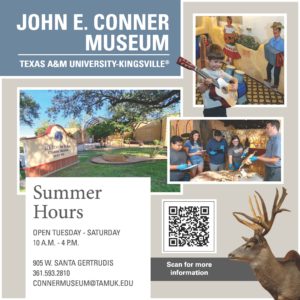$20M grant set to impact Hispanics in Agriculture
Texas A&M University-Kingsville (TAMUK) was awarded $20 million to help provide Hispanic students in the Department of Agriculture with mentorships, tuition along with travel expenses and overall to help encourage workforce development initiatives.
Dr. Natasha L. Mast and Dr. Randall W. DeYoung were project directors and created the proposal to apply for the grant. The overall application was more than 400 pages long. Their 20-page narrative targeted first generation and economically disadvantaged students and mentioned how great the impact would be.
“I was an economically disadvantaged student when I attended Texas A&M University College Station. I worked through college, so I know what it’s like, I know the struggles. I wanted to help my students especially those that I could see putting in the work to get themselves through college,” Dr. Mast said.
While this grant was awarded to TAMUK, other universities such as Texas State University, New Mexico State University, and all the way to Puerto Rico- Mayagüez, which are predominately Hispanic as well, also earned the grant. This means more than 1,200 students will be fully funded throughout all the parties of the collaboration.
“I believe the grant will help the student retention rates because from a lower income, Hispanic students like me, there is not a lot of grants in the agricultural programs. It will encourage students of the agricultural department to really push themselves to stay in school,” College of Agriculture student Marcella Serna said.
The grant, LEADING Hispanics to Federal Agency Employment, set the record as the largest single grant TAMUK has been awarded.
“It will give our current students access to some unique opportunities and allow us to recruit new students who are interested in natural resources. The undergraduate and graduate student support will help pay for tuition as well as travel to internships and to present research at scientific conferences,” DeYoung said.
The United States Department of Agriculture (USDA) created this opportunity for lower income Hispanic students to be able to reach their full potential, especially for those located across Texas.
“The research opportunities are a great way for students to demonstrate their independence and work ethic as well as critical thinking, quantitative skills, and communication skills. Such hands-on, problem-based learning is invaluable and cannot be gained from the classroom. In addition, many students are unaware of the breadth of job opportunities that federal agencies offer. The internships are a great way to build work experience and supervisors who will act as references. Essentially, students can get an inside look at different jobs and discover what fits their interests and skills,” DeYoung said.
Mast is respected by her students, who see the potential of this grant.
“Dr. Mast really opened my eyes to another world of cattle. The impact she has made on me as a student was when I saw a woman in a very male-dominated bovine side of animal science. The College of Agriculture is not just learning farm animals, it’s like a family. The professors and students are the best people you will be meet. When I joined the college of agriculture, it felt like home,” Serna said.
The College of Agriculture has five years to distribute the funds from the grant and has the potential to draw in more attention along with students in the future.

